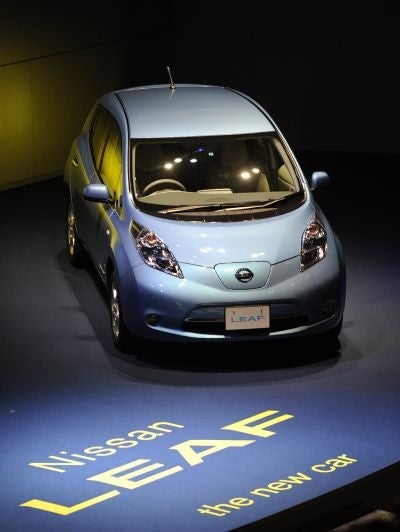Your support helps us to tell the story
From reproductive rights to climate change to Big Tech, The Independent is on the ground when the story is developing. Whether it's investigating the financials of Elon Musk's pro-Trump PAC or producing our latest documentary, 'The A Word', which shines a light on the American women fighting for reproductive rights, we know how important it is to parse out the facts from the messaging.
At such a critical moment in US history, we need reporters on the ground. Your donation allows us to keep sending journalists to speak to both sides of the story.
The Independent is trusted by Americans across the entire political spectrum. And unlike many other quality news outlets, we choose not to lock Americans out of our reporting and analysis with paywalls. We believe quality journalism should be available to everyone, paid for by those who can afford it.
Your support makes all the difference.Green vehicles stole the show in Detroit this year but their success depends on consumers, who are still shying away from their higher price tags.
New models are starting to proliferate following the launch of the all-electric Nissan Leaf and the rechargeable hybrid Chevrolet Volt in 2010.
Hybrid pioneer Toyota has meanwhile presented three new models alongside its trailblazing Prius line and is preparing an electric version of its 4x4 RAV-4 for 2012 in partnership with California's Tesla.
The number-two US manufacturer Ford has also rolled out a new range of compact green vehicles, including the Focus Electric, its first all-electric model, as well as two hybrids, the C-MAX Hybrid and the C-MAX Energi, and the Ford Vertrek, a compact utility vehicle.
China's BYD meanwhile outlined three new electric models, while postponing the US launch of its E6 to 2012.
Chrysler did not put a green car on its stage this year, but is preparing an all-electric version of the Fiat 500 which will be launched in the United States next year.
"As fuel prices continue to increase, this is going to be really preferred by families," Ford President and Chief Executive Officer Alan Mulally said.
However, the flashy models on display at the Detroit auto show this year cannot conceal the fact that green automobiles remain a niche market and have yet to attract the general public.
US sales of hybrid vehicles declined by 2.4 percent last year and they made up just 2.8 percent of the market, according to the Autodata research firm.
And a study published by JD Power and Associates at the end of 2010, entitled "Drive green 2020: more hope than reality," was less than optimistic about future demand.
"Combined global sales of hybrid electric vehicles and battery electric are expected to total 5.2 million units in 2020 or just 7.3 percent of the 70.9 million passenger vehicles forecasted to be sold worldwide by that year," it said.
For Ford's Mulally, the adoption of green vehicles by consumers will mainly depend on improving battery technology.
"Every year we have to improve this technology. We have to improve the size of the batteries, lower their weight, their cost, because these are still very expensive," he said.
"The other thing is the infrastructure for electricity, because we have to be able to operate the vehicle efficiently."
But for Dave Cole, president of the Center for Automotive Research, the bigger question is whether the green vehicle industry is self-sustaining.
"One of the most dramatic questions is can they be competitive on their own without government subsidies," he said.
"I'm confident the cost will decrease," he added, but there is still "tremendous uncertainty on energy prices."
Mulally said Ford has "adopted a point of view that over time we are going to pay more for energy in general."
And John Mendel, a top official at Honda's North American division, said the demand in the US market would remain tethered to fuel prices.
"When (gasoline) hits three to four dollars a gallon people have tended to rush to the hybrid," he said, adding that the Japanese Honda is interested in hydrogen cell vehicles and cars powered by natural gas.
But in the short-term, few manufacturers see such vehicles as a panacea.
"I think it is unlikely to occupy a large part of our portfolio," said Sergio Marchionne, president and chief executive officer of Chrysler.

Join our commenting forum
Join thought-provoking conversations, follow other Independent readers and see their replies
Comments